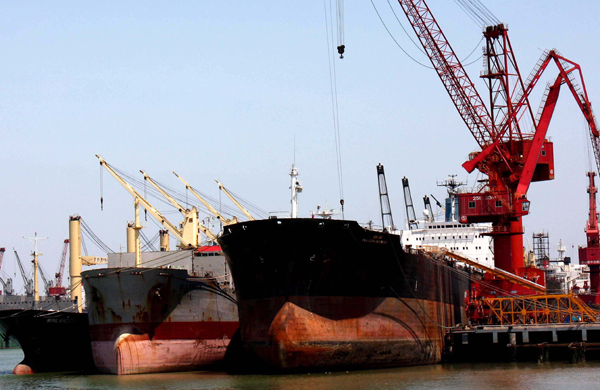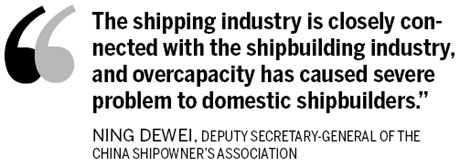COSCO shipyard joint venture to close, as losses mounting
Updated: 2013-05-09 06:02
By Wang Ying in Shanghai (China Daily)
|
||||||||
|
 |
COSCO (Lianyungang) Shipyard Co Ltd, a joint venture between Jiangsu Lianyungang Port Corp Ltd and COSCO Shipyard Group Co Ltd, is to be dissolved after steep losses incurred during the industry downturn.
The move was announced in a Shanghai Stock Exchange filing on Tuesday by Jiangsu Lianyungang Port.

The joint venture was created in early 2008 with a registered capital of 180 million yuan ($29.3 million).
The company is engaged in the construction, design, manufacture and repair of steel structures for vessels. Shanghai-listed Lianyungang Port owns 40 percent, and COSCO Shipyard has a 60 percent stake in the business.
The company posted a 44.98 million yuan profit in 2008, and remained profitable in 2009 and 2010.
But it registered a 30.28 million yuan loss in 2011, which widened to 80.98 million yuan in 2012, according to Liu Kun, a securities representative from Liangyungang Port.
Gao Yakun, from its board secretary's office, said that Lianyungang Port's board of directors will meet on May 16 to decide whether to approve the decision.
Calls to Sha Xiaochun, board secretary of Lianyungang Port, went unanswered.
Orders are drying up for domestic shipyards and freight rates keep diving, without any signs of imminent recovery in the industry.
Analysts warn that more medium-sized shipbuilding companies, including State-owned ones, are likely to close as the industrial slowdown continues to bite.
"The worsening situation is spreading to medium to large-sized companies this year, and these debt-stricken companies are unlikely to find any buyers, and will have to go bankrupt," said Liu Pan, an industrial analyst with Xiangcai Securities.
Lui added that consolidation is inevitable.
COSCO (Lianyungang) contributed a 32.39 million yuan loss to Lianyungang Port's annual figures in 2012, its only money-loosing subsidiary.
South Korea's STX Offshore & Shipbuilding Co Ltd said last month it has also been feeling the effects of the industry downturn, and is planning to sell operations in China to cut mounting debts.
Its Chinese arm, STX Dalian Shipbuilding Co, is seeking fresh capital through selling a 40 percent stake in the business. It was set up in 2007 with investment totaling $1.5 billion.
The South Korean parent is also reported to be considering the sale of shipyards in France and Finland.
In a similar effort to raise investment proceeds, China COSCO Holdings Co Ltd, the world's largest bulk carrier, is selling its wholly owned China COSCO Logistics Co Ltd to the parent COSCO Group, or China Ocean Shipping (Group) Co.
The decision was made after China COSCO Holdings reported losses for the second straight year in 2012, and the company may now cancel plans to float if it fails to turn the losses around in 2013.
In 2011, China COSCO Holdings recorded a loss of 10.45 billion yuan, and followed that with a loss of 9.56 billion yuan last year.
"The shipping industry is closely connected with the shipbuilding industry, and overcapacity has caused severe problem to domestic shipbuilders," said Ning Dewei, deputy secretary-general of the China Shipowner's Association.
He added that major Chinese shipowners have agreed to submit a joint proposal to the central government, to reduce their fleets by scrapping older ships.

 Michelle lays roses at site along Berlin Wall
Michelle lays roses at site along Berlin Wall
 Historic space lecture in Tiangong-1 commences
Historic space lecture in Tiangong-1 commences
 'Sopranos' Star James Gandolfini dead at 51
'Sopranos' Star James Gandolfini dead at 51
 UN: Number of refugees hits 18-year high
UN: Number of refugees hits 18-year high
 Slide: Jet exercises from aircraft carrier
Slide: Jet exercises from aircraft carrier
 Talks establish fishery hotline
Talks establish fishery hotline
 Foreign buyers eye Chinese drones
Foreign buyers eye Chinese drones
 UN chief hails China's peacekeepers
UN chief hails China's peacekeepers
Most Viewed
Editor's Picks

|

|

|

|

|

|
Today's Top News
Shenzhou X astronaut gives lecture today
US told to reassess duties on Chinese paper
Chinese seek greater share of satellite market
Russia rejects Obama's nuke cut proposal
US immigration bill sees Senate breakthrough
Brazilian cities revoke fare hikes
Moody's warns on China's local govt debt
Air quality in major cities drops in May
US Weekly

|

|







